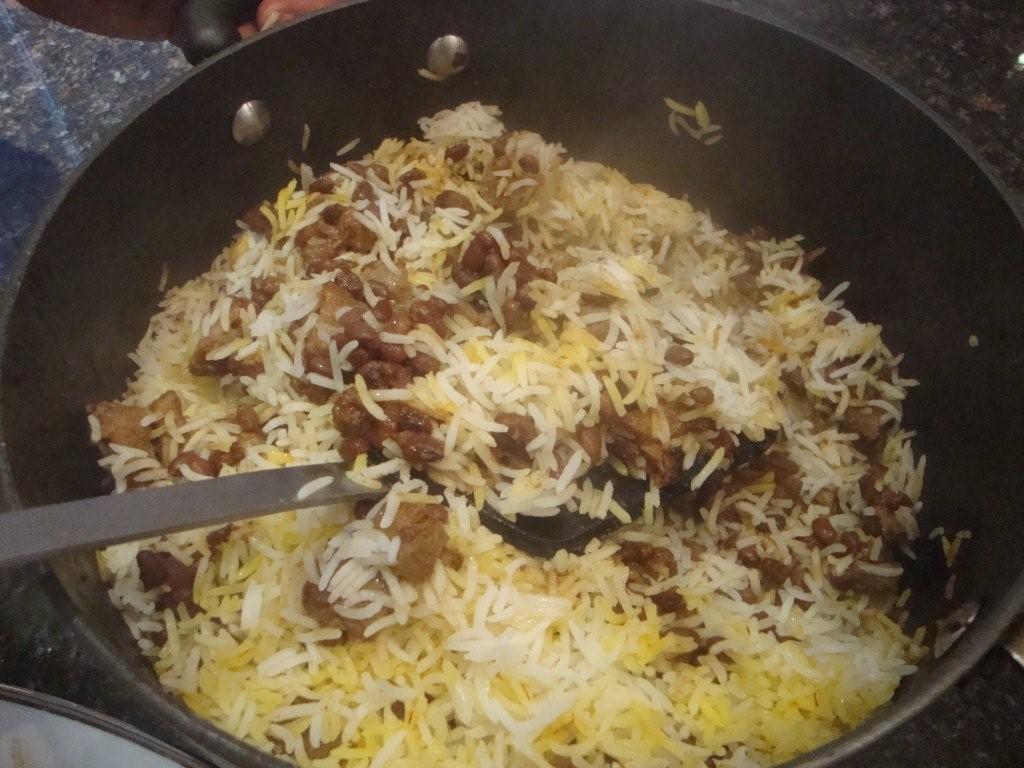One cannot visit Iran without noticing the warmth and hospitality of its people. The cultures, traditions and foods with which Iranians mark special occasions are as rich as the country's history.
When visiting a local Iranian home one is always greeted with a lovely pot of tea served from a samovar. The tea is consumed black with sugar cubes – or rocks of sugar – which are placed in the mouth and gently melt as the hot tea is sipped. Never has tea tasted so good! Dried fruits and nuts are often offered on a silver platter as accompaniments.
 The crispy, burnt rice at the bottom of a pot of Lubia Pilau is a sought-after delicacy! Nazma Lakhani
The crispy, burnt rice at the bottom of a pot of Lubia Pilau is a sought-after delicacy! Nazma LakhaniBerenj (rice) is the staple of the Iranian diet and is typically eaten with kebab or ash (stew). When strolling down the streets of Tehran, one is usually engulfed with the pleasant aroma of rice flavoured with saffron. A delicacy is the crispy, “burnt” part at the bottom of the rice pot (I remember my sister and I frequently quarrelling for this choice portion!)
Like many culinary traditions, the food of the Iranians varies according to the occasion. For instance Nowruz – which marks the start of a new year and is celebrated on 21 March – is the first day of spring and has a long history. Preparations start well before the actual day, with seeds of lentil, barley or wheat being sprouted.
 Olavieh Salad brings together shredded chicken with creamy mashed potato and egg, smothered in a mayonnaise, olive and garlic dressing. Nazma Lakhani
Olavieh Salad brings together shredded chicken with creamy mashed potato and egg, smothered in a mayonnaise, olive and garlic dressing. Nazma LakhaniTraditionally the sofreh, or dining table, is graced with a special table cloth and seven dishes comprising foods or agricultural items that represent new life, health, happiness, prosperity, joy, patience and beauty. Items placed on the sofreh may include sprouted seeds representing birth, apples for health and beauty, and a basket of painted eggs for fertility.
Part of the Nowruz tradition includes new clothes for each family member and a gift of eydi (money); usually a crisp new note or shiny coins are given to the children.
 The use of fresh herbs, spices and dried fruits gives Persian dishes a distinct essence, texture and fragrance. Nazma Lakhani
The use of fresh herbs, spices and dried fruits gives Persian dishes a distinct essence, texture and fragrance. Nazma LakhaniPersian dishes are delicately made with varying herbs like dill and parsley then mixed with spices like cinnamon and limo omoni (dried lime). Dried fruits and nuts are often added to meat, chicken or fish. The use of fresh herbs, spices and dried fruits gives each dish a distinct essence, texture and fragrance. At the end of a meal a generous plate of fresh fruit is served.
Persian food is not only wholesome and nourishing, but offers exotic dishes rich in aroma, colour and flavour.
Are you planning to prepare a Persian meal? Give these Iranian recipes a try: Olavieh Salad, Spinach Broni, Lubia Pilau, or Ice in Heaven for dessert.








